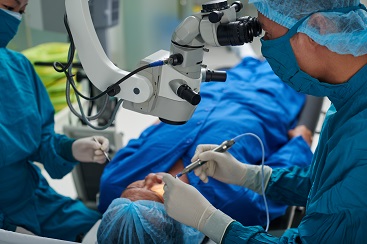
As elective surgeries resume, vendors face stricter ambulatory surgery center (ASC) and hospital re-entry rules.
More stringent rules affect medical device representatives present during certain aerosol-generating surgical procedures. Those reps should don fit-tested N95 respirators with face shields or surgical N95 respirators, according to Joint Re-Entry Guidance from the AHA, AORN and AdvaMed.
New Safety Vision for Surgeries
To comply, Ivantis, a provider of minimally invasive glaucoma surgical (MIGS) solutions, turned to Mobile Health to schedule Respirator Fit Tests (RFTs) for field staff assisting or proctoring surgeons during Hydrus Microstent® implantations. Additionally, Ivantis sourced a supply of personal protective equipment (PPE): three types of N95 masks, face shields, sanitizer, gloves and surgical masks.
“Previously, hospitals and ASCs always provided PPE for visiting field staff,” notes Todd Abraham, Ivantis VP of Operations and Chief Compliance Officer. “Today, our field staff must bring their own PPE to hospitals, drawing from Ivantis’ inventory.” Because of the myriad of regulations across regions and clinical settings, Ivantis reps review entry rules with each facility prior to scheduled visits, he adds.
So far, Mobile Health has fit-tested about 15 percent of Ivantis field staff. Fit-testing assures the right mask and fit adjustments for an employee exposed to workplace airborne hazards. Read RFT FAQs.
Surgery Suspension Transforms Training
Suspension of elective procedures in mid-March 2020 hit Ivantis hard, Abraham continues. In the United States, its eyelash-sized microstent may only be implanted during cataract surgery, the elective procedure most heavily impacted by COVID-19. Most cataract surgery candidates are 60 years and older, a group vulnerable to the virus. However, the company is seeing a slow return to pre-COVID-19 levels.
Suspension also prevented hands-on training in the clinical setting. However, a fortuitous pre-pandemic launch of its digital learning system eased Ivantis’ shift to virtual training for surgeons learning implantation techniques. The AHA-AORN-AdvaMed guidance also urges remote delivery of services and support by medical device representatives whenever possible.
Still, virtual training is no substitute for relationships between field personnel and surgeons, Abraham adds, a connection the Mobile Health RFTs help to facilitate. “It’s the best thing for patients to have a partnership between industry and clinicians.”
Respirator Fit Tests for Hospital Re-Entry
For medical device companies and other vendors needing to comply with hospital re-entry rules, Mobile Health provides RFTs in a number of ways:
- By appointment at one of seven NYC clinics or 3,000+ partner providers in its national network;
- Remotely via its FIT KIT, which allows smaller businesses to fit test their own employees, using Mobile health supplies and support;
- Onsite at the place of business for larger groups via its Mobile Services team.
And as all businesses reopen, Mobile Health delivers a suite of COVID-19 screening and testing services, either at its clinics or at employers’ work sites. Contact an Account Manager, and a Mobile Health team member will respond within 24 hours.
Tags: elective surgery, hosital re-entry, medical device companies, MedTech, N95 respirators, Respirator Fit Test, RFT

